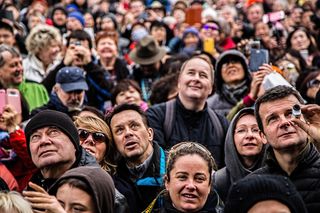Extroversion
Extraversion Kills
How extraverts may be more susceptible to the coronavirus.
Posted April 18, 2020 Reviewed by Kaja Perina

Extraverts, those who are outgoing and generally seek out a relatively high level of social connections and attention, may be more likely to contract corona than are introverts. Think about that for a moment ...
Last year, I wrote a piece that summarized the population distribution of introverts and extraverts in terms of what evolutionary behavioral scientists often call balancing selection. The idea here is designed to address the question of why, across pretty much all human populations that have been studied on the topic (see Costa & McCrae, 1985), human populations tend to have an even mix of introverts and extraverts. As introversion/extraversion has regularly shown as having a substantial heritable (genetic) component (see Nettle, 2008), this finding, of relatively even ratios of introverts to extraverts, suggests, from an evolutionary perspective, that the long-term genetic benefits of each strategy roughly equals the long-term genetic benefits of the other strategy. That is to say, on average, over time, rates of survival and reproductive success for introverts should roughly equal rates of survival and reproductive success of extraverts.
You might scratch your head upon hearing that. In many societies, such as the hyper-individualistic USA, extraversion seems to be encouraged from an early age, presumably because it is a beneficial social strategy.
- Don't be afraid to speak your mind.
- Get to know others and make sure to have lots of friends.
- Don't be a wallflower.
It seems odd that people would, in terms of such cultural norms, encourage a behavioral strategy in our kids that is, mathematically, no better than the main alternative strategy (which would, in this case, be introversion).
On this point, in a somewhat recent post, I addressed this specific issue as follows:
Extraverts enjoy such benefits as increased social status, increased social network size, increased number of sexual partners, and being rated as relatively attractive as mates. On the downside, they are more likely to die young, they have increased risk of accidents, and they are more likely to experience harsh relationship dissolution related to such things as infidelity. (Geher, 2019)
In other words, while extraverts may receive all kinds of social benefits, such as increased size of one's social network and more romantic partners across one's lifetime, they also may run into such survival-inhibiting scenarios such as physical accidents. Extraversion actually kills.
When I wrote that piece, I cited renowned evolutionary psychologist, Dan Nettle (2008), whose work on this topic is considered pioneering.
And, for the record, let me say here that I am not taking issue with that perspective. But I think there is something that has taken place since the publication of Nettle's (2008) work on this issue that may shed important light on this topic. And that something is this: COVID-19.
Evolution Takes the Long View
While Nettle's (2008) ideas on how extraverts run into survival-inhibiting outcomes is intriguing in terms of the kinds of issues that one might run into under normal conditions (accidents, relationship dissolution, etc.), think about the potential effects of a pandemic like corona. Based on what we know about the Spanish flu of 1917, such a pandemic has emerged about once a century over the past two centuries. Pandemics are not everyday events. But (and this is the point) they do happen. And they probably always will.
Recently, Wes Rogers, a biology faculty member at Georgia Gwinnett College, asked me a question that he had asked his students: Are humans still evolving? As Wes pointed out to me, when you think about this question in terms of differential death rates for people with different genotypes (and, thus, phenotypes) as these people respond to the effects of a pandemic, the answer may well be yes. Maybe pandemics are not equal-opportunity killers. We know that corona affects people with some demographic features (e.g., being a male) moreso than others, for instance.
Maybe Extraverts Are More Likely to Be Affected by Corona
With this evolutionary perspective in mind, maybe a more basic reason for equal ratios of introverts to extraverts is found not so much in costs of extraversion such as increased likelihood of dying in a physical accident. Maybe the primary reason that the ratios of introverts to extraverts tends to balance out has to do with the possibility that extraverts, partly due to their increased sociality, are more likely to be adversely affected during pandemics of highly communicable diseases relative to their introvert counterparts.
Think about it. Extraverts seek out people. Introverts don't. When there is a pandemic going down, who might be more likely to interact with a higher number of people? Who might be more likely to spend time with a broad array of others? Who might be, to put a modern spin on it, less likely to follow social distancing policies?
And, of course, if extraverts maintain their gregariousness during an infectious global pandemic, their gregariousness will do no favors to themselves or to others.
In another recent post, I proposed the provocative thesis that corona may actually facilitate a drive toward social interaction. That is, the virus may hijack the nervous system to unconsciously encourage people to interact with others. In fact, examples of pathogens that have such effects are widespread (see Moore, 2002). And there is even evidence that the common flu may have such effects of humans (see Reiber et al., 2010).
The extraversion hypothesis laid out in the current post may be a simple complement to this idea that corona has some mechanisms for increasing sociability during the early, contagious stages
In other words, there are two distinct testable hypotheses here:
1. Corona may tend to hijack the nervous systems of people in general so as to increase gregariousness (and, thus, facilitate its own spread)
and
2. The heritable and foundational personality trait of extraversion, with its tendency to facilitate increases in social interactions, may well put people at risk for both contracting and spreading the virus.
From an evolutionary perspective, we can now see how, per the extraversion hypothesis, over long periods of time, natural selection might faciltiate a balanced ratio of extraverts-to-introverts in human populations. In short, intermittent pandemics may adversely affect more extraverts than introverts, thus increasing the relative presence of introverts (and genes that facilitate introversion) in human populations.
Bottom Line: Look, I'm pretty extraverted AND I am a COVID-19 survivor, so note that, importantly, this post is not designed to pass judgment on one kind of person over another. Rather, it's designed to help use evolutionary principles (in this case, the idea of balancing selection) to help us maybe better understand the nature of this worldwide crisis that is affecting us all so deeply. The extraversion hypothesis is an easily testable hypothesis and I would be fully supportive of any behavioral scientists who wanted to actually conduct research to test it. The results of such research may, in fact, have important implications for understanding the brushfire-like spread of this beast of a virus.
This post was partly inspired by recent conversations on this topic that I've had with Stephen Bohan MS MD (Associate Professor (ret), Harvard Medical School).
Facebook image: Volurol/Shutterstock
References
Costa, P. T., & McCrae, R. R. (1985). The NEO Personality Inventory manual. Odessa, FL: Psychological Assessment Resources.
Moore, J. (2002). Parasites and the Behavior of Animals. New York: Oxford University Press.
Nettle, D. & Clegg, H. (2008). Personality, mating strategies and mating intelligence. In G. Geher & G. F. Miller (Eds.), Mating intelligence: Sex, relationships, and the mind’s reproductive system (pp. 121-135). Mahwah, NJ: Lawrence Erlbaum.
Reiber, C., E.C. Shattuck, S. Fiore, V. David, P. van Goozen, and J. Moore. 2010. Change in human social behavior in response to a common vaccine. Annals of Epidemiology 20(10): 729-733. DOI: 10.1016/j.annepidem.2010.06.014




